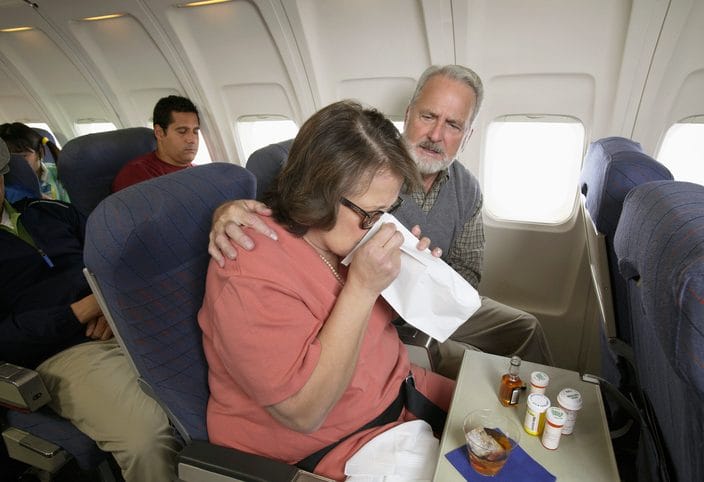
Many grandparents cherish these special moments they can share with their grandchildren, but what happens when that grandchild is diagnosed with celiac disease?
What to do when grandchildren can no longer eat grandma’s famous cookies or grandpa’s special dumplings, or dinners made from family recipes handed down for generations?
What happens when grandparents just don’t understand the condition?
To be clear, we’re not picking on nana and grandpa. There are many grandparents out there who have taken an active role in helping their celiac grandkids live healthily and happily gluten-free. Others just may not yet grasp the seriousness of this autoimmune disease, where even a crumb of gluten can send their grandchild into severe gastrointestinal distress or a host of other symptoms.
Many may have never heard of celiac disease until their own grandchild was diagnosed. A celiac disease diagnosis can bring families to a crossroads where tradition and health intersect. How can parents navigate these territories in the best interest of their children?
We asked the Beyond Celiac community on Facebook what they do to work with grandparents – and received some great responses. I’ve compiled four steps to helping grandparents understand what their grandchild with celiac disease needs to stay safe, and have included a few of our favorite contributions.
1. Explain Celiac Disease
Calmly explain celiac disease to the grands, (or to anyone who is in the position of caring for or feeding your child). Make it apparent that this is a serious disease. That yes, just one cookie does harm your child. Show them stats and information on symptoms that can arise from eating gluten, such as diarrhea, anemia, failure to thrive and anxiety.
In fact, one tiny taste of wheat, barley or rye can do serious damage, even if the person has no symptoms at all. Make a list of no-no foods and places where gluten can hide. If your parents are technologically savvy, share online links or videos. Grandparents can learn more and get involved with resources such as BeyondCeliac.org, social media support groups, the Beyond Celiac Facebook page and gluten-free blogs. Be a strong advocate for your child.
As Becca E. suggests on Facebook, “I tried to gently explain and suggest, but now I am very straightforward. I am also prone to telling people to Google it so they aren’t just taking my word. I can only explain something so many times!”
2. Create Gluten-Free Safe Spaces
If grandparents are really into baking and cooking for your child, help them to create a safe gluten-free space in their kitchen. Perhaps provide them with their own dedicated gluten-free baking/cooking tools. Share gluten-free books, recipes and blogs to get them started. Stock their pantry with gluten-free baking mixes and ingredients. If your parents have a special, gluten-filled recipe, help them to devise a gluten-free version. Make it a fun family event.
You can even create your own online family group, as Beyond Celiac Facebook follower Kate K. did with her family: “We started a Facebook group for our girls with a couple helpful articles as well as photos of what they look like when glutened. Everyone says how healthy they look, but they don’t see what they look like when glutened. It helps.”
3. Educate Your Child As Well
 Kids can help to educate the grandparents. Photo: Getty
Kids can help to educate the grandparents. Photo: Getty It’s never too early to teach your kids about celiac disease and what it means. Let them know they can say “no” to grandma and grandpa when it comes to accepting food and situations that can affect their health. Send them for visits with gluten-free food and snacks. And as Nancy D. suggested, “Teach your children and they will have fun teaching their grandparents. It is also good for them as they get older to manage their eating in various settings.”
4. If All Else Fails, Supervise!
Unfortunately, there are some people who just won’t get it, grandparents or not. As Erica B. shared, “I’ve tried and tried to explain that we will be extremely sick, but they don’t believe me and say we can only get better by eating gluten. I’ve completely stopped trusting anything they serve.” If you have parents or in-laws who just refuse to follow diet restrictions, then you’ll have to take away time alone with the kids until they get with the program.
In the end, it’s all about being an advocate for your child, in whatever situation they may be in. But as Pam B. wonderfully reminds us: “Be consistent, be kind and provide the food. It will reduce the fear and educate them simultaneously. Let them be grandparents. Work with them. They love your child, too. The child needs to be able to connect with family and not fear them.”
Alice Bast is CEO of Beyond Celiac, the national organization working on behalf of the celiac patient community. Visit BeyondCeliac.org to learn more.
Read more articles by Alice Bast:
Celiac Disease Research: Asking the Right Questions
Keeping Your Costs in Line on a Gluten-Free Diet
Debunking 4 Big Celiac Myths





